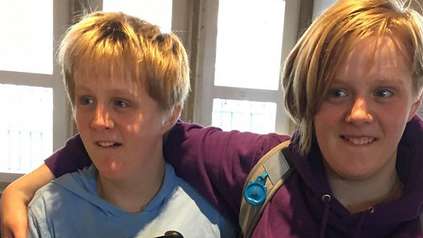Head of Human Genetics elected Fellow of the Royal Society
Dr Matthew Hurles has been elected to Fellowship of the Royal Society, the UK’s most prestigious scientific organisation. The announcement today (17 April) recognises Dr Hurles’ research into the genetic roots of undiagnosed developmental disorders. His work has provided many hundreds of families with clinical diagnoses and laid the foundations of national clinical genetic screening services in the UK and worldwide.
Dr Hurles, who leads the Human Genetics Programme of research at the Wellcome Sanger Institute, is the scientific lead of the DECIPHER (Database of Chromosomal Imbalance and Phenotype in Humans using Ensembl Resources) project, which developed into the DDD (Deciphering Developmental Disorders) project. These two initiatives showed that analysing the whole genomes of people whose conditions defied diagnosis could provide clinically useful results.
The success of the studies spurred the UK Government to create the UK National Health Service’s 100,000 Genomes Project. This research, in turn, has evolved into the NHS Genomic Medicine Service, which is supported by Congenica, the Sanger Institute’s spin-out company founded on the analysis software developed for the DDD project.
“I am thrilled and humbled to be elected to the Royal Society. I am honoured to be joining an organisation that promotes scientific excellence to deliver insights that benefit all. Yet the research I lead would not be possible without the collaboration, cooperation and goodwill of many thousands of parents, children, doctors, nurses and researchers who make nationwide research studies possible. This award recognises their generosity, dedication and skill in helping to deliver meaningful genetic diagnoses for generations to come.”
Dr Matthew Hurles Head of the Human Genetics Programme and co-lead of the DDD project at the Wellcome Sanger Institute
In addition, Dr Hurles has pioneered research on how DNA varies in structure between individuals, and how this contributes to disease, as well as how errors in the copying of DNA from one generation to the next results in each of us having a unique set of new mutations in our DNA.
“Matthew richly deserves this honour from the Royal Society. Since starting his research group at the Sanger Institute in 2003, he has helped to establish new ways to understand developmental disorders, providing both clinicians and parents with much-needed information and clarity. From helping doctors to create new clinical diagnoses to providing parents and children with guidance and support, the insights his team have delivered and the UK-wide networks he has helped to build will power foundational research and genomic medicine for many years.”
Professor Sir Mike Statton Director of the Wellcome Sanger Institute
The Royal Society is the UK’s most prestigious scientific organisation and Dr Hurles is among 50 Fellows and 10 International Members who have been elected to Fellowship. The Fellows are based in both the UK and the Commonwealth, and in institutions in Argentina, Israel, the Netherlands and the United States.
The new Fellows will be formally admitted to the Society at the Admissions Day ceremony in July, when they sign the Charter Book and the Obligation of the Fellows of the Royal Society.
“Over the course of the Royal Society’s vast history, it is our Fellowship that has remained a constant thread and the substance from which our purpose has been realised: to use science for the benefit of humanity. This year’s newly elected Fellows and Foreign Members of the Royal Society embody this, being drawn from diverse fields of enquiry — epidemiology, geometry, climatology — at once disparate, but also aligned in their pursuit and contributions of knowledge about the world in which we live, and it is with great honour that I welcome them as Fellows of the Royal Society.”
Venki Ramakrishnan President of the Royal Society
More information
About the Royal Society
The Royal Society is a self-governing Fellowship made up of the most eminent scientists, engineers and technologists from the UK and the Commonwealth. Fellows and Foreign Members are elected for life through a peer review process on the basis of excellence in science. Each candidate is considered on his or her own merits and can be proposed from any sector of the scientific community. Every effort is made to encourage nominations of women candidates and candidates from the emerging disciplines.
There are approximately 1,600 Fellows and Foreign Members, including around 80 Nobel Laureates. Each year up to 52 Fellows and up to 10 Foreign Members are elected from a group of around 700 candidates who are proposed by the existing Fellowship.
Honorary Fellowship is intended for those who have given distinguished service to the cause of science, or who have brought great benefits to science, but who do not have the scientific achievements of the kind required of those who could be elected as Fellows or Foreign Members. Honorary Fellows include Bill Bryson and Melvyn Bragg.
New Fellows are formally admitted to the Society at the Admissions Day ceremony in July, when they sign the Charter Book and the Obligation of the Fellows of the Royal Society.
Selected websites
Wellcome Sanger Institute
The Sanger Institute is one of the world’s leading genome and biodata institutes. Through its ability to conduct research at scale, it is able to engage in bold and long-term exploratory projects that are designed to influence and empower science globally. Institute research findings, generated through its own research programmes and through its leading role in international consortia, are being used to develop new diagnostics and treatments for human disease and to understand life on Earth. Find out more at www.sanger.ac.uk or follow @sangerinstitute on Twitter, Facebook, LinkedIn and on our Blog.
Wellcome
Wellcome exists to improve health by helping great ideas to thrive. We support researchers, we take on big health challenges, we campaign for better science, and we help everyone get involved with science and health research. We are a politically and financially independent foundation. wellcome.org




